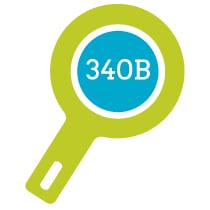 New data published in The New England Journal of Medicine shows that many non-profit hospitals are not meeting charity care requirements in the Affordable Care Act. These requirements were intended to help address concerns from critics who questioned whether non-profit hospitals were providing sufficient benefits to justify their tax-exempt status, which was valued at $24.6 billion in 2011. Past analysis of 340B hospitals, which must be non-profit, found that about one-quarter provide charity care that represents less than one percent of their total patient costs. Additionally, about two-thirds of 340B hospitals provided less charity care than the average for all hospitals—including for-profit hospitals. This new study suggests that one reason for the low rates of charity care at many 340B hospitals is that in 2012 only 44 percent of non-profit hospitals regularly notified patients that they might be eligible for free or reduced price care before the hospital started debt collection.
New data published in The New England Journal of Medicine shows that many non-profit hospitals are not meeting charity care requirements in the Affordable Care Act. These requirements were intended to help address concerns from critics who questioned whether non-profit hospitals were providing sufficient benefits to justify their tax-exempt status, which was valued at $24.6 billion in 2011. Past analysis of 340B hospitals, which must be non-profit, found that about one-quarter provide charity care that represents less than one percent of their total patient costs. Additionally, about two-thirds of 340B hospitals provided less charity care than the average for all hospitals—including for-profit hospitals. This new study suggests that one reason for the low rates of charity care at many 340B hospitals is that in 2012 only 44 percent of non-profit hospitals regularly notified patients that they might be eligible for free or reduced price care before the hospital started debt collection.
The data analyzed by the University of Michigan in the new study suggests that low-income patients who qualify for hospital charity care programs are being charged higher rates than insured patients at 29 percent of non-profit hospitals. The study also found 20 percent of hospitals were still reporting unpaid debt to credit agencies or pursuing legal actions such as placing liens against the patient's property, despite the fact that these actions are now prohibited by law until the hospital has made efforts to determine if the patient is eligible for charity care.
Even if more hospitals comply with the requirements to notify patients of the charity care policy and limit charges to those patients, it is not clear that this would translate to more relief for patients. The Affordable Care Act and its implementing rules do not have requirements for who must be eligible for free or reduced cost charity care. The new study noted it is possible hospitals could restrict eligibility as they come into compliance with the Affordable Care Act requirements.
 According to analysis of 2015 Health Resources and Services Administration (HRSA) and Medicare data, about 45 percent of non-profit hospitals participate in the 340B program. Notably, these 340B hospitals do not face any additional charity care requirements in exchange for benefiting from steep 340B discounts. By participating in 340B, these hospitals are able to purchase medicines at the discounted 340B price and can then profit from the spread when they are reimbursed at a higher price. The administration recently released a new proposed guidance on the 340B program, but it did not introduce any new requirements to ensure that patients benefit from the 340B discount at the non-profit hospitals that participate in the program. Given that non-profit hospitals do not have requirements on the scope of their charity care programs (either under the 340B program or under the Affordable Care Act provision, as it allows non-profit hospitals to set their own eligibility standards for charity care), additional charity care requirements for hospitals that participate in the 340B program should be considered.
According to analysis of 2015 Health Resources and Services Administration (HRSA) and Medicare data, about 45 percent of non-profit hospitals participate in the 340B program. Notably, these 340B hospitals do not face any additional charity care requirements in exchange for benefiting from steep 340B discounts. By participating in 340B, these hospitals are able to purchase medicines at the discounted 340B price and can then profit from the spread when they are reimbursed at a higher price. The administration recently released a new proposed guidance on the 340B program, but it did not introduce any new requirements to ensure that patients benefit from the 340B discount at the non-profit hospitals that participate in the program. Given that non-profit hospitals do not have requirements on the scope of their charity care programs (either under the 340B program or under the Affordable Care Act provision, as it allows non-profit hospitals to set their own eligibility standards for charity care), additional charity care requirements for hospitals that participate in the 340B program should be considered.



 New data published in The New England Journal of Medicine shows that many non-profit hospitals are not meeting charity care requirements in the Affordable Care Act. These requirements were intended to help address concerns from critics who questioned whether non-profit hospitals were providing sufficient benefits to justify their tax-exempt status, which was valued at
New data published in The New England Journal of Medicine shows that many non-profit hospitals are not meeting charity care requirements in the Affordable Care Act. These requirements were intended to help address concerns from critics who questioned whether non-profit hospitals were providing sufficient benefits to justify their tax-exempt status, which was valued at  According to analysis of 2015 Health Resources and Services Administration (HRSA) and Medicare data, about 45 percent of non-profit hospitals participate
According to analysis of 2015 Health Resources and Services Administration (HRSA) and Medicare data, about 45 percent of non-profit hospitals participate

